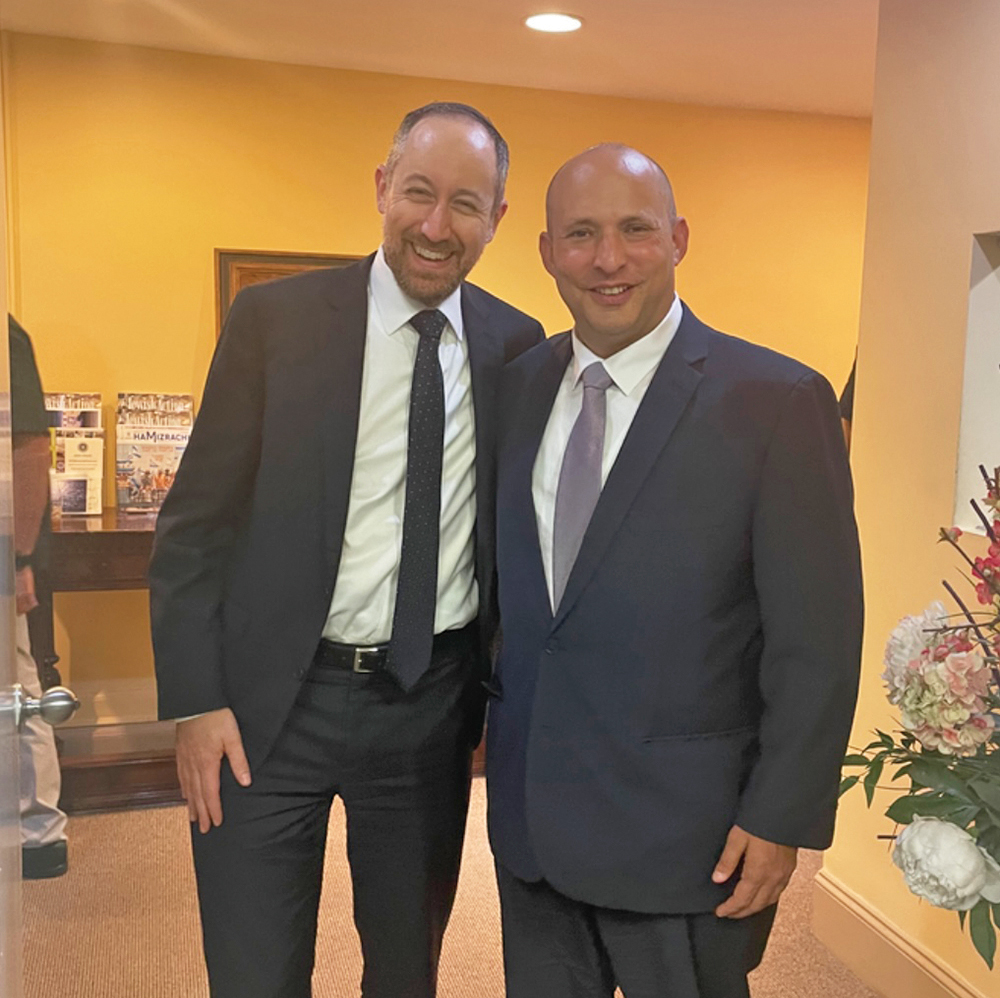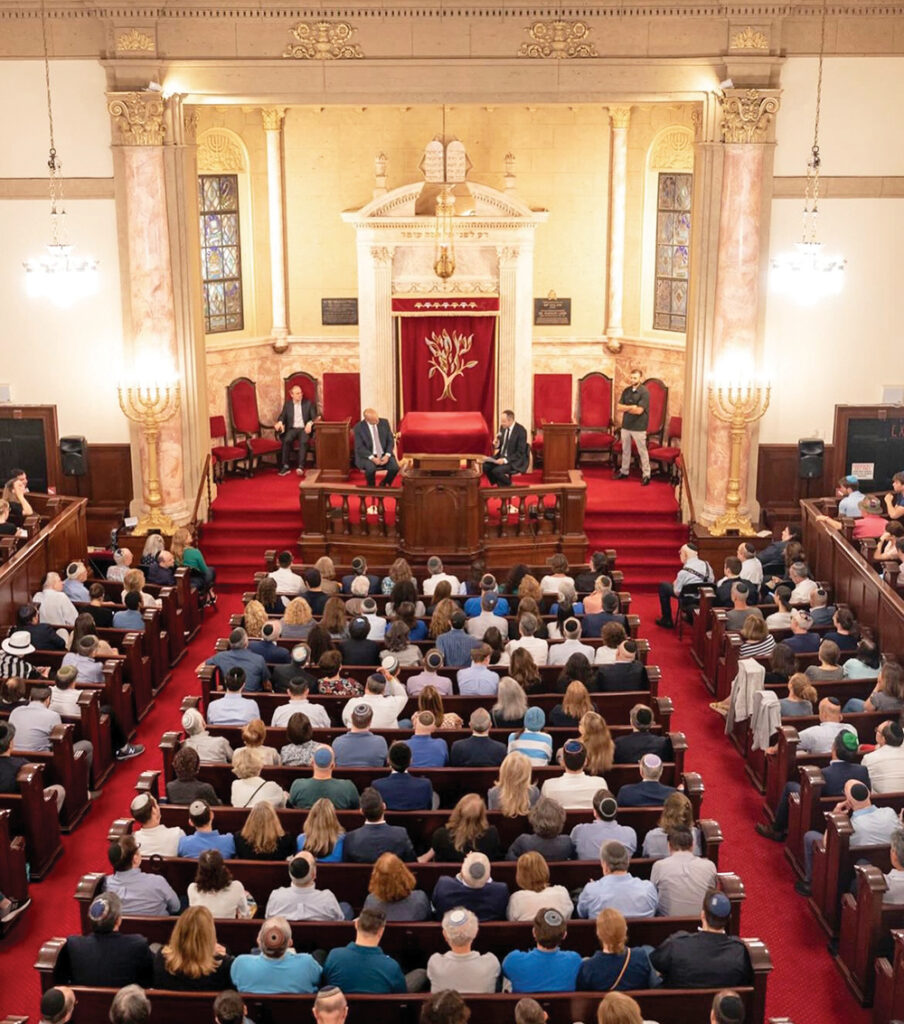
On August 6, The Jewish Center on the Upper West Side was privileged to host Naftali Bennett, Israel’s 13th prime minister, and hear his thoughts on several pressing issues relating to Israel and the Jewish people.
The format of the discussion was question and answer, with The Jewish Center’s Rabbi Dr. Yosie Levine posing the questions to Bennett. Both the questions and answers are paraphrased below.
Q: October 7 has become a date like September 11 or December 7, which is shorthand for a pivotal historical moment. Help us to understand how we should think about October 7 today, and what the legacy of that awful day will be.
NB: We will succeed and be Am Hanetzach in the State of Israel, but we have a tremendous amount of work to do.
October 7 tells two stories. The first is the complete failure of Israel to adhere to its founding principle, which is that Jews will never again be helpless during a pogrom. On October 7, that is exactly what happened. Institutional Israel completely collapsed and nothing functioned properly, from the education ministry to the welfare ministry.
The second half of the story is the unbelievable rise of Am Yisrael. We saw thousands of young adults race down to the Gaza envelope into the unknown to fight for people they did not know.
There was a 42 year-old man named Elchanan, who was the father of five children. Early in the morning on October 7 Elchanan got in his car with his brother and nephew, all of whom had pistols, and they drove down to Kibbutz Be’eri. For 16 hours, the three men went from home to home and evacuated families to the entrance of the Kibbutz. They saved 100 people. At 9 a.m. the next morning, Elchanan was shot and killed. There were thousands of Elchanans who exhibited unimaginable bravery.
We saw ordinary Israelis jump into action. In addition to the well-known massacres on October 7 of Kibbutz Kfar Aza, Kibbutz Nir Oz, Kibbutz Be’eri and the Nova Festival, there were another 60 kibbutzim, communities and cities that were attacked. In these lesser-publicized invasions, Israelis fended off the attackers and prevented pogroms.
We must remember that we have the most talented young generation in the world, and the toughest generation that Israel has ever seen. Much like World War II soldiers who fought and came back to America and carried it for the next 50 years, this generation in Israel will carry us through the next 50 years. It will be the greatest period in the history of the Jewish people.

We’re all holding our breath waiting to see what Iran’s response will be to the assassinations of Hezbollah and Hamas leaders over these past few weeks. What might we expect in the coming days? Do things escalate from here or is there a way to avoid a broader regional war?
There are two scenarios. The more likely scenario is that the fighting will be contained for a few days. There is a smaller chance that the fighting will escalate and become a broader conflict.
We’re in a regional war now, though. It is a one-way war where Israel is being hit. We have to deal with Iran and its proxies such as Lebanon, Iraq and Syria.
Iran and its proxies can be looked at as an octopus, where Iran is the head of the octopus and its proxies are the arms spread across the Middle East shooting rockets at Israel. Our mistake for the past 30 years is that we did not cut Iran’s head.
We need to topple the Iranian regime, which is highly doable and doesn’t necessarily require a full-out war. America and Israel can take soft action to accelerate the collapse of the regime. For example, there is an opposition in Iran and it is alone. We can help the opposition fight the regime.
If America and Israel don’t act, Iran will ultimately strike America. Israel is fighting America’s war. Israel needs America to have its back.
Israel is now fighting its longest war since the War of Independence. We see reports of reservists now serving for 10 months. Even before the war in Gaza, you argued in favor of Charedi conscription, which has now been mandated by the Israeli Supreme Court. What’s the solution? This issue is so divisive and so fraught. How can Israel move ahead with the Charedi community without causing a rupture in society?
There’s a law that says every Israeli must serve in the military, and we need the Charedim to abide by the law.
There is a tremendous burden on the reservists who have been serving for so many months. The Charedim are our brothers and sisters and we love them, but we need their help and they must serve.
The notion of a community which is exempt from living in the world is not part of the Jewish tradition. Rambam was a doctor, and Rashi was a vintner. Judaism is about living with ideals, and not about divorcing yourself from real life.
While you were prime minister, you were asked by the parties to serve as a mediator of sorts between Vladimir Putin of Russia and Vlodomir Zelensky of Ukraine, and famously had a Shabbat meeting with Putin. From that experience, what do you believe Israel can do to keep Russia from deepening its alliance with Iran?
We need to topple Iran’s regime. There’s a huge Anti-American axis of Iran, China, North Korea and Russia. I think we can, at a fairly low cost, kick Iran out of this axis. In terms of Russia itself, however, we are very limited.
Jews in the Diaspora are facing a level of antisemitism unlike anything most of us have experienced in our lifetimes, with college campuses seeing a tremendous amount of antisemitism. What advice do you have for us on how to address this, and what role should the government of Israel properly play?
The most important thing is that Israel remains strong and that we win.
In terms of all the antisemitism directed at us, it’s virtually impossible to change minds. The goal of fighting back is to energize us to be strong, which is what we did when we stood up to the presidents of Harvard and Penn.
We will never be loved as Jews. If we’re poor, we’re a burden on society, and if we’re rich, we’re too successful. If we don’t have a country, we’re looked at as a landless group, but if we have a country, we’re colonialists.
We have to be proud to be Jewish, and we have to be strong and united. But we won’t be loved.
In soliciting questions from the congregation to ask you, the one question most asked was, “What can we do to help? We see Israelis bearing the brunt of this and want to do our share or at least to lighten the load carried by Israelis.” Help us to think about how we can help you.
Visit Israel. It matters. The best is to make aliyah!
In the world of philanthropy, redirect funding towards Jewish causes.
One particularly important cause in America is that every Jewish child should have a Jewish education.
Don’t be silent. If anyone trashes Israel, speak up. Even if you won’t persuade anyone, you’ll be energized. Never be ashamed of being Jewish or loving Medinat Yisrael.
What gives you hope, and what should give us hope about Israel’s future?
Emunah in Hashem and the eternity of the Jewish people and this younger generation.
Most essential for the future of Medinat Yisrael, though, is that we must not fight each other from within.
This is the third time we have a Jewish sovereign state in the Land of Israel. We lost our two previous sovereign states due to internal fighting.
Even prior to October 7, the year 2023 was a very difficult year in Israel because we were tearing each other apart about nothing. There was tremendous sinat chinam.
There is one additional thing that you can do to support Israel: Every time you talk to an Israeli, tell them to stop fighting each other.
You’ve been in public service for most of your adult life. Might we see a return to public life for Naftali Bennett? What could get you to return to politics in Israel?
We’ll see. If we’re missing the wheel, I’ll be the wheel.
The Jewish Link spoke with Rabbi Levine following the discussion. “It was a special honor to host Prime Minister Bennett at The Jewish Center,” he said. “We need more leaders who can inject into the public discourse aspirations rooted in Jewish values. And we need more voices of moderation. Mr. Bennett doesn’t just talk about centrism and bridge-building; he’s modeled those virtues in a very real way. When we just pause for a moment and remember the story of Israel, it’s hard not to be optimistic about the future.”
Judith Falk is the creator of the Upper West Side Shtetl Facebook Group. You can follow her on instagram @upperwestsideshtetl. She is a lawyer by day and a former legal reporter.









